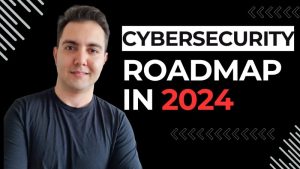If anyone is telling you that you need to have a master’s degree or bachelor’s degree in IT or cyber security to become a Cyber Security Analyst, they’re not telling you everything. They’re just gatekeeping. It’s not that having a degree is not a good thing, but it is not mandatory anymore for cyber security roles. So, what must you do to become a Cyber Security Analyst? Let’s find out.
How to Become a Cyber Security Analyst with No Experience?
As said earlier, you do not need a degree to start your journey to become a Cyber Security Analyst. However, if you have practical hands-on experience, know about certain tools, and even have certifications, you have a better chance of getting the job. I will tell you how to become a Cyber Security Analyst in three easy steps to make it easier for you. So, let’s go.
Step 1: Build Foundational IT Knowledge
You need to have foundational IT knowledge. It means knowing about operating systems, how the Windows operating system works, how to navigate that operating system, etc. As part of that, you need to know about the following:
Networking: By networking, I don’t mean that you have to get yourself Network+, CompTIA A+, and other certifications. Now, I am not against them. What I’m trying to tell you is that it’s okay to go through those certifications and content, but you have to be picky and choose only the things that you need to understand and learn.
Let’s say when you are doing CompTIA A+ certification, you don’t have to learn about printers. You can refer to some sections about computers, fundamentals, cables, and networking. But don’t waste your time on unnecessary information.
I recommend you understand TCP IP in depth, know routing basics like static routing, how routing works, and how different protocols like DNS, SMTP, and SSH work. Know all these famous applications and understand them from a networking perspective.
Linux Basics: Understanding Linux will give you unique skills and knowledge. It will help you in the long run with your job-hunting phase. With Linux, all you have to do is understand the basics, like how to navigate operating systems, how to set a directory or file permission, how to add users, etc. You don’t need to become a system admin to start your cyber security journey with Linux.
Cloud Computing: Now, when it comes to cloud computing, you don’t need to become a cloud engineer or cloud guru. But you have to understand the terminologies in the cloud. For example, when you’re invited for a job interview, you need to understand and know a few things about the cloud, how it all fits together, how to build virtual machines in their networking in the cloud, and all the basic things.
The best resource for you to learn, specifically when it comes to Azure, is AZ 900. Moreover, there are so many free trainings out there on YouTube that you can refer to.
Step 2: Learn Security Specific Tools
Next, you have to dive into security-specific tools. For an entry-level security analyst role, you need to understand different security tools and focus only on the tools and skills the companies offering the job need.
When you look at their job description, they need certain tools and skills from you. So, you need to know about security-specific tools. I will name a few tools you need to learn to increase your likelihood of getting and nailing those interviews.
The first thing is that you need to understand SEAM Tools. Most companies these days are using Splunk or Rapid7 Seam tools or Microsoft Sentinel. If you don’t know which one to choose, I would recommend:
- BTL One (Blue Team Level 1)
- Cyber Defenders
- LetsDefend
You also have to learn about EDR Tools like Crowd Strike, Microsoft Defender and Nessus Vulnerability Scanner. There are so many training programs out there that you can leverage and learn these tools and skills needed to use them.
Step 3: Job Hunting
The last part of becoming a Cyber Security Analyst is actually getting that job interview, which I think is the most crucial part of the journey. This part, called the job-hunting phase, requires dedication, hard work, and consistency. Here are some strategies to increase your chances of getting interviews.
Apply to Multiple Jobs in High Volume: Imagine that you apply to ten jobs and another person applies to 100 jobs. Who is going to get more interviews? Maybe you’ll get one, but that person will get maybe five or ten. So, you need to increase your volume, monitor the job-search websites, and apply aggressively.
Personalize Your CV for Each Job Post: Your CV is an important part of your application. It is your marketing brochure that will help you sell yourself and your skills to the hiring manager. So, you need to make sure that you have a solid CV that highlights the skills you have learned throughout your journey.
Since each job requirement is different, you need to modify your CV and tweak it based on the job description for each job that you apply for. There are so many Al tools out there that you can use for this purpose. If needed, get professional CV writing services because the goal here is actually to make sure someone sees your CV in the first five or ten seconds.
Leverage Networking Tools: The old way of applying to jobs is over. People just applied for jobs, got interviews, and that’s it. But these days, the Cyber Security field is so competitive. You’re going to face a lot of competition in your journey.
So, make sure you put extra effort into applying for a job role. Leverage tools like LinkedIn. Build your brand there, establish meaningful connections with people, and use those connections to get your first job in cyber security.
It’s a great platform for getting jobs because when you establish yourself on LinkedIn, you can communicate with hiring managers, HRs, and security managers, show your skills, and brand yourself accordingly.
Bonus: 3 Common Mistakes People Make When Trying to Get into Cyber Security
Before you start your Cyber Security Analyst journey, you need to avoid some common mistakes people make when trying to get into cyber security. Let’s talk about them so you can avoid them.
Getting Stuck in the Learning Phase: A lot of people get stuck in the first phase. They learn and are always afraid to move to the next stage. They feel they need to be perfect for that specific job. Don’t be that person.
You have to get yourself out there and apply for jobs. I know that the confidence level that you’re looking for will never come. And the only way you can find out if you are good enough for that specific role in cyber security is to actually get yourself out there and apply for the job.
Saying No to Networking: Many people don’t want to talk to people, to put themselves out there. But the old way of applying for jobs is over. You must embrace new ways of getting out there, attending networking events, and connecting with people on platforms like LinkedIn.
Neglecting Practical Experience: Theory alone is not enough. Make sure to get hands-on experience, learn the tools practically, and try to create some real-world scenarios for yourself while you’re going through the learning process.
Becoming a Cyber Security Analyst: Summary
The first step is foundational IT knowledge. Make sure to nail this part because without the proper foundation, the house will crumble, and you’re not going to get far ahead in the industry.
The second step is learning security-specific tools in a practical way.
When you’re invited for an interview, these are the things that you can talk about in the interviewing process. You have to show them that you have done some projects and learned skills in your journey.
The last part, which I think is the most important part, is the job-hunting phase. In that part, you have to have a solid CV, apply more aggressively, personalize your job posts, and network with other people on LinkedIn to increase your likelihood of getting more interviews.
Now that you know how to become a Cyber Security Analyst, do not waste time. Get started today!












